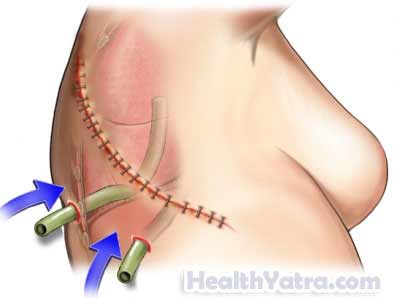تعريف
A thoracotomy is a surgery to open the chest wall. The surgery allows access to the lungs, throat, aorta, heart, and diaphragm. Depending on the disease location, a thoracotomy may be done on the right or left side of the chest. Sometimes, a small thoracotomy can be done in the front part of the chest.
أسباب هذا الإجراء
A thoracotomy may be done to:
- Confirm diagnosis of a lung or chest disease
- Repair the heart or the vessels of the lung and heart
- Treat windpipe disorders
- Remove a portion of the lung or the entire lung
- Treat throat disorders
- Reinflate lung tissue that has collapsed due to disease or trauma
- Remove pus from the chest
- Remove blood clots from the chest
المضاعفات المحتملة
If you are planning to have a thoracotomy, your doctor will review a list of possible complications, which may include:
- نزيف
- العدوى
- Damage to the organs in the chest
- رد فعل للتخدير
- Collection of air or gases in the chest
- Persistent pain—rare
تشمل العوامل التي قد تزيد من خطر حدوث مضاعفات ما يلي:
- Major trauma involving multiple body parts
- عمر
- Heavy smoker
- Previous stroke or heart attack
- Prior radiation therapy
- Chronic medical problems
ما يمكن توقعه
قبل الإجراء
Your doctor may perform:
- اختبار بدني
- اختبارات الدم والبول
- X-ray, CT scan, or MRI scan of the chest
- Pulmonary function tests to see how well your lungs work
- Heart function tests
Leading up to surgery:
- Talk to your doctor about your medicines. You may be asked to stop taking some medicines up to one week before the procedure such as:
- الأسبرين أو غيره من العقاقير المضادة للالتهابات
- مميعات الدم
- You may be asked to use an enema to clear your digestive system.
- Do not eat or drink anything after midnight.
- To minimize complications, stop smoking at least 2-3 weeks before surgery.
التخدير
General anesthesia will be given. You will be asleep during the surgery.
الوصف الداخلي
You will be placed on your side with your arm elevated. An incision will be made between two ribs, from front to back. The chest wall will then be opened. In some cases, the doctor may take a different approach. The doctor can then do whatever procedure needs to be done in the open chest. When the procedure is done, one or more chest tubes will be placed. The tubes will make sure that blood or air does not collect in the chest. The chest wall will be closed. The incision is closed with stitches or staples and bandaged to prevent infection.

مباشرة بعد الإجراء
You will be sent to the intensive care unit for recovery. You will be monitored closely.
كم من الوقت سيستغرق ؟
3-4 hours or longer
كم هو مؤلم ؟
Anesthesia prevents pain during the procedure. You may have some discomfort after the surgery. Your doctor will give you medicine to help you manage the pain.
For some, a thoracotomy can lead to a chronic pain syndrome. It is usually described as burning pain in the area of surgery. It may be associated with increased sensitivity to touch in this area. It usually lessens over time, but you may need to see a pain specialist if the pain persists.
متوسط الإقامة في المستشفى
The usual length of stay is 5-10 days. Your doctor may choose to keep you longer if complications arise.
رعاية ما بعد العملية
في المستشفى
- You will have IV lines and tubes in and around your body. Some of the lines and tubes will help you urinate, breath, and get nutrition. Most of the lines and tubes will be removed as you recover.
- You may be given antibiotics, pain medicine, or anti-nausea drugs.
- Do coughing and deep breathing exercises. Do them often to help keep your lungs clear.
- Get out of bed often and sit in a chair. Increase your activity as much as you are able.
في البيت
عند عودتك إلى المنزل، قم بما يلي للمساعدة في ضمان التعافي بسلاسة:
- اسأل طبيبك حول, عندما هي آمنة للاستحمام, السباحة, أو نقع في الماء.
- شرب الكثير من السوائل.
- لا تدخن.
- Avoid environments that expose you to germs, smoke, or chemical irritants.
- تأكد من اتباع تعليمات طبيبك.
استدعاء الطبيب
After you leave the hospital, call your doctor if any of the following occur:
- Difficulty breathing or cough
- New pain in the chest or persistent and severe pain in the area of surgery
- Stitches or staplesthat come apart
- Excessive bleeding at the site of the incision
- Coughing up mucus that is yellow, green, or bloody
- علامات الإصابة, بما في ذلك حمى وقشعريرة
- احمرار، تورم، زيادة الألم، نزيف مفرط، أو إفرازات في موقع الشق
- الغثيان أو القيء الشديد
- Pain, burning, urgency or frequency of urination, or persistent blood in the urine
في حالة الطوارئ ، اتصل على المساعدة الطبية على الفور.
